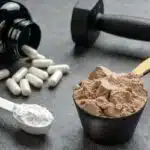Alcohol and Breast Cancer: Understanding the Connection

by Rebecca Jaspan, MPH, RD, CDN, CDCES
Can alcohol intake increase your breast cancer risk? There is increasing research showing a link between alcohol intake and increased risk of breast cancer. Alcohol intake accounts for 6% of all cancers in the United States and moderate alcohol consumption is linked to 30-50% increased risk of breast cancer. Moderate alcohol consumption is defined as 15-30 grams of ethanol or 1-2 drinks per day .1 Ethanol is the type of alcohol found in alcoholic drinks. The standard size for one drink is 12 ounces of beer, 5 ounces of wine, and 1.5 ounces of 80-proof liquor. The amount of alcohol someone drinks on a daily basis, not the type, is the most important factor attributed to raising breast cancer risk, according to the research.
How does alcohol increase breast cancer risk?
There are likely a number of different ways alcohol may increase breast cancer risk but the mechanism isn’t fully understood at this point. What we do know is that alcohol acts an irritant in the body and can damage cells. When these cells try to repair themselves, DNA can possibly be changed and thus lead to cancer. Drinking alcohol leads to oxidative stress in cells, which is associated, with an increased risk of breast cancer.
Alcohol has an effect on the body’s ability to absorb certain nutrients. Of particular interest is folate, which is important for healthy cell growth and function, including red blood cell formation and research shows that women with daily dietary folate intake between 153 and 400 micrograms showed a significant reduced breast cancer risk than those who consumed less than 153 micrograms.2 Consuming alcohol can decrease folate absorption, putting individuals at higher risk of breast cancer. Even taking in a higher amount of folate regardless amount of folate you take in, if youre drinking alcohol you have decreased absorption of folate and that will put individual at higher risk of breast cancer. Add men and women!!
Alcohol can raise estrogen levels, which is common in hormone-linked breast cancers such as estrogen positive breast cancer. Other risk factors include older age, family history of breast or ovarian cancer, lack of physical activity, and cigarette smoking. This makes it challenging to separate alcohol intake from these other risk factors in the development of breast cancer.3
What about after cancer treatment?
There is not enough strong evidence to suggest that alcohol consumption after chemotherapy will increase the risk of recurrence. It is recommended for individuals undergoing treatment to avoid alcohol. Alcohol will irritate mouth sores and an already irritated GI tract caused by chemotherapy. Further, many chemotherapy drugs used to treat breast cancer are broken down by the liver. Alcohol is also processed by the liver and can cause liver inflammation. This inflammatory response could impair the effectiveness of chemotherapy.
Does this mean you need to avoid alcohol completely? The American Cancer Society recommends that people who choose to drink alcohol should have no more than 2 drinks per day for men and 1 drink per day for women.4 We encourage you to make your owns decision with your oncologist and your registered dietitian.
References
- McDonald JA, Goyal A, Terry MB. Alcohol Intake and Breast Cancer Risk: Weighing the Overall Evidence. Curr Breast Cancer Rep. 2013 Sep;5(3):10.1007/s12609-013-0114-z. doi: 10.1007/s12609-013-0114-z. PMID: 24265860; PMCID: PMC3832299.
- Chen P, Li C, Li X, Li J, Chu R, Wang H. Higher dietary folate intake reduces the breast cancer risk: a systematic review and meta-analysis. Br J Cancer. 2014 Apr 29;110(9):2327-38. doi: 10.1038/bjc.2014.155. Epub 2014 Mar 25. PMID: 24667649; PMCID: PMC4007237.
- Sun YS, Zhao Z, Yang ZN, et al. Risk Factors and Preventions of Breast Cancer. Int J Biol Sci. 2017;13(11):1387-1397. Published 2017 Nov 1. doi:10.7150/ijbs.21635
- Alcohol Use and Cancer. American Cancer Society





